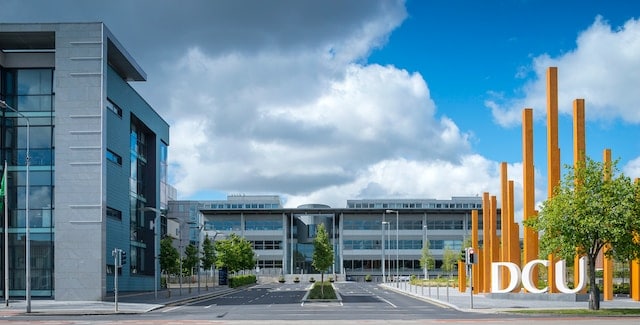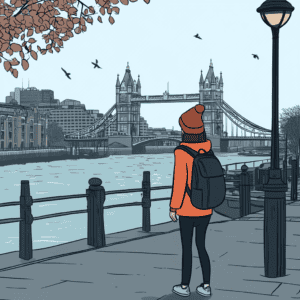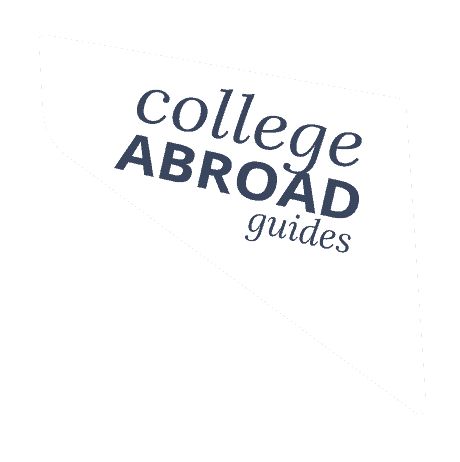What’s it Like at Dublin City University (DCU)?

- Originally published
- Last updated on August 14th, 2023 at 11:49 pm
Table of Contents
Looking for a partner in crime? A place with one foot firmly in the pub and the other solidly within the world’s top 500 university rankings? Welcome to Dublin City University. It’s easy to get DCU confused with bigger universities because it seems to punch above its weight in so many areas, offering students a waterfall of courses and society options. There are 140 student clubs here, while University College Dublin (student population: nearly double DCU’s) hosts about 70. Students come to DCU ready to play.
But we dug into some of the academics, too.
Want to know the basics? Learn about Irish universities first.
Dublin City University Basics
Degrees: BA (Hons), BSc (Hons)
Majors: Education, business, science & health, engineering & computing, and humanities & social sciences departments with 70 programs, including combination majors like “physics with biomedical sciences,” “physics with astronomy,” and “physics with data analytics.” There are also certificate programs (typically ten credit modules taken part-time over three semesters) that can augment your degree, like “homeless prevention and intervention” in the school of Nursing. Unique courses of study include a new “Climate and Environmental Sustainability BA in the School of History and Geography, promising learning through “hackathons, sprints, gamification, and challenge-based team learning” with an optional year-long study abroad/work placement, so students can finish in 3 or 4 years. There is also a new business analytics specialization within the Business Studies degree.
Location: Glasnevin, Dublin
Cost for out-of-EU: €11,300–€18,000 with most programs €14,000-€15,000
On-campus housing cost: €5,600-€6,200 academic year
FAFSA Funds: Yes
Abroad from abroad: Yes, within Europe with the Erasmus Program and outside of Europe with a program coordinated by your department with partnerships in the US, Canada, Mexico, Turkey, China, Japan, Korea, and Australia
Student body: 19,000 total students, about 3,600 international
Five adjectives: Occupational, sporty, bustling, inclusive, convivial
From Dublin’s Burbs to its Centre City Hub
DCU occupies its main Glasnevin campus in a desirable north suburb of Dublin, home to established estates and plentiful green spaces. In the 1950s, well-to-do families moved out of the city center, motivated by parks along the north canal, wide boulevards, and close proximity to the sights and sounds of Dublin. The result is large, suburban thoroughfares and not much nightlife.
The area already had long had a reputation for country houses, peace, and quiet. After all, most of its residents can be found not in the area’s residential houses but buried in its vast cemetery, once a source of income for Victorians hard on their luck and looking to earn £2 for supplying a fresh corpse to the local medical school students. Perhaps that is part of why the neighborhood earned a reputation as a place for “thieves and rogues.” The cemetery is now better known as the final resting spot of Michael Collins and other Irish patriots. Glasnevin’s other claim to fame, its botanical garden, is about as lively as the cemetery. But Albert College Park is next to campus, and after class, you can try your hand at tennis, catch a cricket match, or sip your latté in the magical Tram café. This is an ideal campus for joggers who will find the park paths varied and seemingly infinite.
When DCU’s sprawling campus took over a corner of town in the 1980s, little changed in this quiet part of Dublin. Students here stick to the bar on campus or jet into the city center (they can walk to O’Connell Street in 45 minutes) rather than pouring into Glasnevin’s sleepy streets. The All Hallows and St. Patrick’s campuses are nearby, also marked by large lawns, light brick and stone buildings, and tree-lined roads. Stroll along Drumcondra Road by the All Hallows campus to Kavanaugh’s Old Time Sweets and grab yourself a bag of lemon sherbets to help you study. On Saturdays, you’ll also find a small, local crafts market to peruse.
Our Irish roommate intercepted us as we were going out to NuBar and offered to come. The next day, he showed us around the city, and we had a magical experience just seeing it through the eyes of a local. International students aren’t used to the things other students are used to, and everything is a little harder when you don’t know anyone.
Looking for Dublin’s City Life?
Buses come right into the heart of campus and can have you downtown in 15 minutes. There are multiple bus routes from Ballymun Road that can also deliver you to the city center. Once you’re there, visit the Temple Bar neighborhood for a pint. The central city is all within walking distance. You can get acquainted by starting the semester with a walking tour to help orient you, starting on the patriotic O’Connell Street, where you’ll find the national monument, affectionately known as the “Stiletto in the Ghetto”, and James Joyce’s jaunty statue (“the Prick with the Stick”).
I loved to spend the day in city center just wandering and seeing new sites.
You’ll also get some stories of Dublin’s tough history alongside the rhyming slang.
Hit the DTwo nightclub for dancing on the south side of St. Stephen’s Green, right on the tram line or Capel Street, on the north side, for the LBGTQ community center, chock full of bulletin boards, classes, and events. There are also plenty of secondhand shops where you can deck out your dorm in style. The city center woos students from suburban campuses for food and nightlife.
You can find nearly every kind of scene within a 30-minute bus ride from campus, making the DCU campus a centrally located hub from which you can explore the entire region.
Get out. Say yes to things you wouldn’t normally say yes to. Drinks with friends, shopping days, sitting in the park. Say yes to absolutely everything.
Campus + Housing at DCU
Campus and Society Life
DCU’s suburban collegescape resembles an 80s American university, with little architecture to inspire students but plenty of resources to help them out in real life, from groceries to sports facilities.
In fact, DCU is the bar-none winner for sporty students in all of Ireland.
Its main sports complex offers student rate memberships so that you can socialize with international sports scholarship students in the cavernous and gargantuan facility. Swim a few laps in the pool, hit the spa, or participate in a fitness class. Even the St. Patrick’s campus, where the college of education students will spend most of their time, boasts two sports halls.
There are 150+ student clubs and societies on campus, with many featuring sports from cycling and triathlon to Gaelic football. Badminton? Caving? Cricket? Equestrian? Handball? Ladies’ rugby? There are sports you probably didn’t get to try in high school to explore at DCU.
Sporty students are happy students, and when they graduate and lose access to this top-class gym, they’ll be consoled as DCU ranks near the top of the world for graduate employability, so take advantage of the university’s ties to the expanding business world in Dublin. The USTART incubator provides contributes to the business environment. It provides not only space, but funding, for entrepreneurial students who want college to give them the tools to start their own businesses.
I loved College Park! Was an amazing dorm area and felt like home.
If you’re hesitant to head off campus, the grounds can accommodate most student needs. The large “U” building (student union) provides rooms for student clubs, hosts concerts and balls, and can serve up snacks. There’s a student bar for pints and slices. Want to DIY? There’s also a small grocery store on campus, along with a pharmacy. In between classes, head to the Interfaith Center for a quiet room and a charging station. Both perks can get you up and running before your next class.
Living on Campus and in Dublin
Housing and dining are unremarkable, designed for efficiency rather than inspiration.
However, both can be more affordable than their Dublin-area counterparts. At Glasnevin, the Larkfield apartments and Hampstead student accommodations house first-year students. Larkfied consists of private single bedrooms in pairs, so that two students share a kitchenette and bathroom, with a communal social space on each floor. Larkfield is located in the heart of campus, so rolling out of bed and into class is simple.
Privately owned homes are the way to go. I thought I wanted student housing, but in the end it didn’t matter because I got so much more for my money by renting a room on my own.
Hampstead is mainly for 2nd and 3rd-year students, with a significant block for1rst year students. However, it’s less commonly known as a first-year dorm. Single rooms with an ensuite bath are the draw here, grouped into “apartments” of 5 rooms that share a large kitchen and social space. The dorms feature a lot of institutional cinderblock and hotel card keys, with rules against posters and even setting items on windowsills. There’s no other word for it; they feel cold. Even so, students may be anxious they won’t be offered a room at all. DCU hosts a lottery system with wait lists to divide rooms each year and many first-years walk away disappointed.
Both buildings, where new students are likely to find themselves, are increasingly in demand alongside private rental options. When students are left without housing, they turn to the stretched private market, using sites like rent.ie and daft.ie, often without luck. DCU’s student population is on the increase as is Dublin’s. Both are desirable and expensive destinations, stretching student budgets.
Study Up: Educational Opportunities and Rankings
Multiple undergraduate programs are available through six schools at this large university. For instance, in the Business School, you won’t just find a business degree. You’ll be able to apply for programs in Marketing, Innovation, and Technology. You could also try Digital Business and Innovation. Aviation management is even an option.
Choose a Global Business degree specializing in one of five countries – you’ll be a part of your partner university in that country and pursue an international work placement there as part of your studies. You’ll pursue another work placement in Ireland and graduate with a year’s worth of work under your belt. The choices are France, Spain, the U.S.A., Canada, and Germany. The program means studying two years in Dublin and two years in another country, for a multilingual and multi-cultural experience. In short, DCU offers multiple degrees with an emphasis on vocational know-how and options that liberal arts and sciences schools cannot offer.
I was really intimidated. I found they had some of the top students in the country. But they are also used to international students coming from different backgrounds, who are used to different things and don’t understand the system. They welcome everyone.
DCU’s Academic Strengths
Sure, you’ll also be able to study some foundational courses, like religion and social sciences. But English? Nope. Sculpture? Not here. Instead, offerings feel centered on managing the business side of literature and the arts, so you will find degrees in Multimedia, Journalism, and Communication. New programs in 2021 include a bachelor of engineering in Sustainable Systems and Energy and a BSc in Global Challenges, centered on climate, health, water, and energy problems that emerged as a partnership between the School of Law and Government and the School of Electronic Engineering.
Programs of note to students looking to capitalize on DCU’s unique strengths are in health and physical education, for example, athletic therapy and training. The course includes a four-month stint working in an athletic training program, including in the U.S.
Some programs are three years long with an option to graduate in four years after an international or internship year. For example, the joint honors degree in humanities lets students take their third year to study or work though competition for placements can be fierce. After four years, graduates earn a BA (Joint Honors) International and may have relevant work experience on their CVs to boot.
Want to Apply?
About 20% of undergraduates are international students and DCU maintains an international student office that can help answer questions about applying from multiple countries. There’s even a good chance there is a regional DCU representative at an event you can attend and have your questions answered. US students should have a 3.0 GPA and SATs of 1725 with no score under 550 or an ACT score of 24-26. It’s also desirable to have AP scores of 4 or higher, or, where applicable, an IB diploma with a score of 24, including English and math.
Apply directly to the university as a non-EU student by downloading the application form by July 1. You’ll have to apply for the BSc in Nursing by Feb. 1, and future nursing students will go through the Central Applications Office (CAO). However, other international undergraduate applications will need to be sent via email, and the application fee of €50 paid online. The application has the details. You can apply to up to three programs on the application at the same time.
Looking to Study at Dublin City University or Beyond?
Start with the basics of going to college in Ireland. And if you’re still unsure, check out other Irish universities like Trinity College Dublin and University College Dublin. From the historical to the postmodern and even the cheapest, the Emerald Isle has a lot of options. Maybe DCU is yours, but if not, we’ve got you covered.
Related Posts

Jessica Share
Jessica is the writer, Ph.D., and mom-of-an-abroad-student-in-the-UK at the helm of College Abroad Guides. When she's not asking college students where the coolest place to hang out in their city is, she's figuring out how she can make $60 imported Greek oregano potato chips and £50 British bacon potato chips appear on her doorstep for the cost of a local bag of Lay's.





